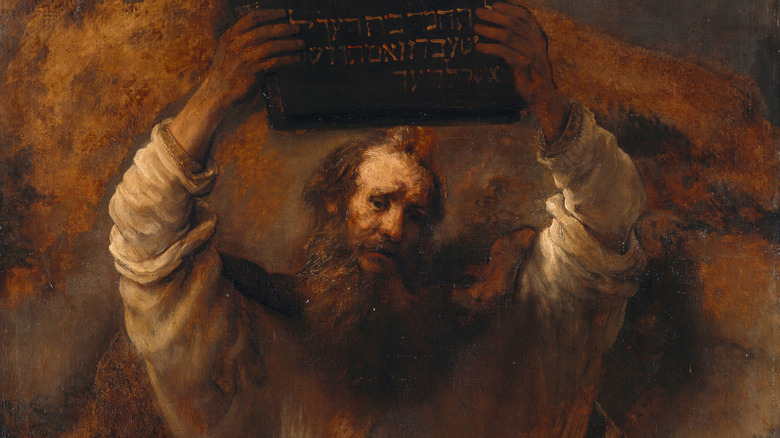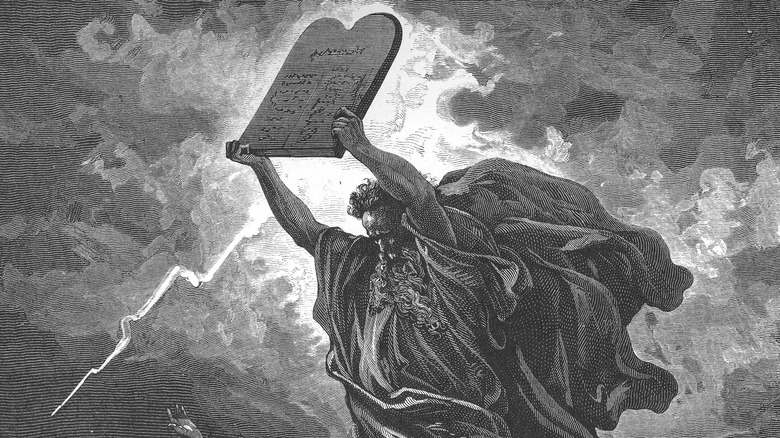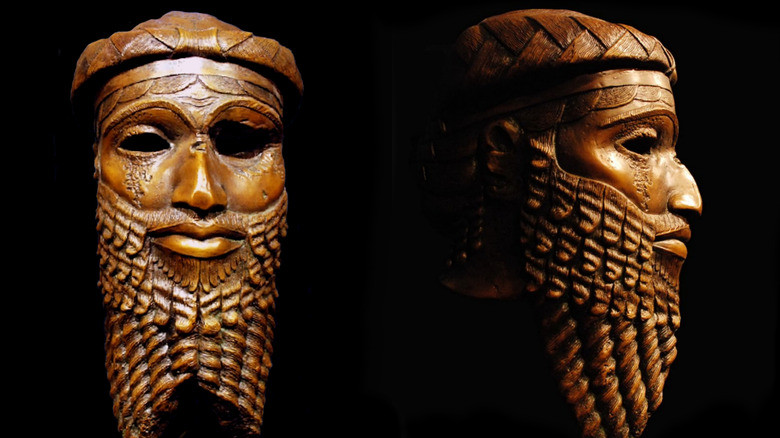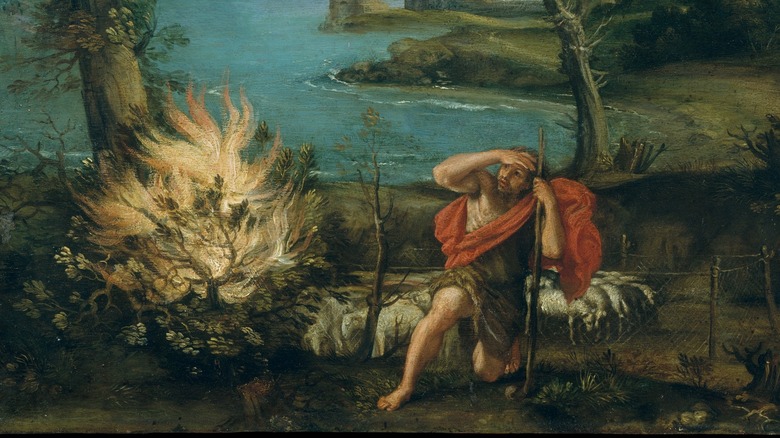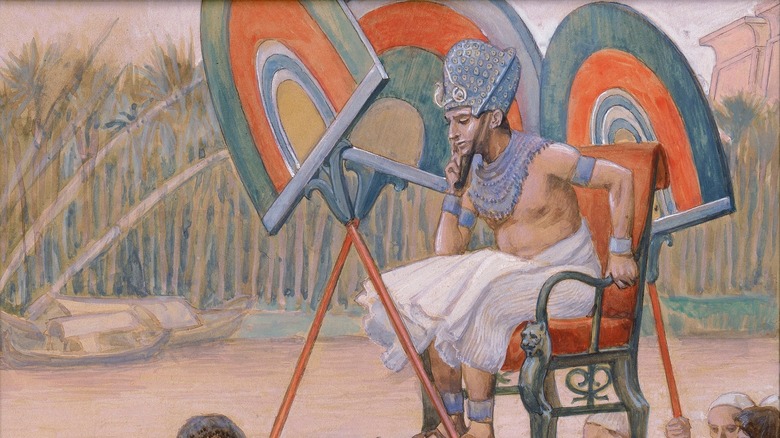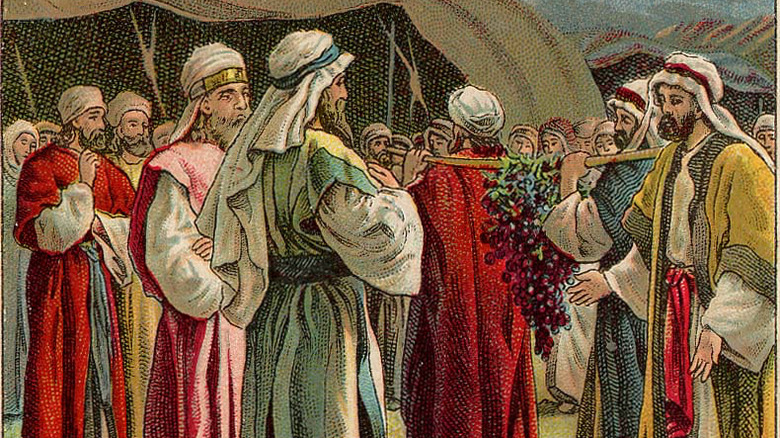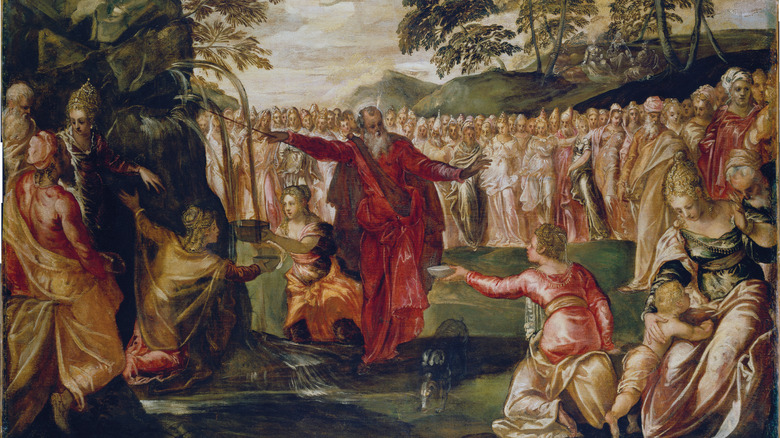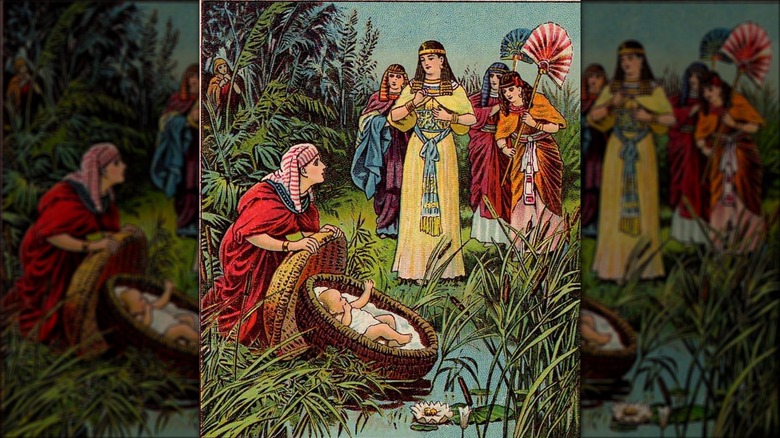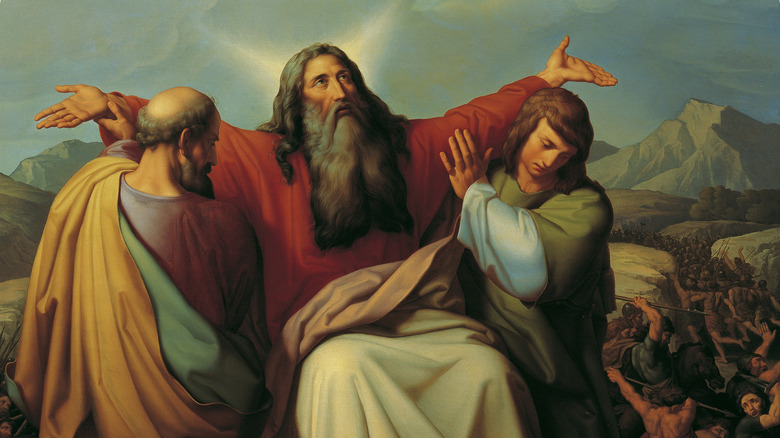Things We Ignore About Moses
The story of Moses is gripping, starting in the book of Exodus with the man's birth as a persecuted and enslaved Hebrew. In a desperate attempt to save her baby son's life, his mother puts him in a reed basket and sets him afloat on the river Nile. He's miraculously recovered and raised by the Egytpian royal family. Moses eventually runs into trouble, flees, and begins a new life as a sheep herder. Then God speaks to him and demands that he go straight back to the Egyptian pharaoh and demand the release of the enslaved Hebrews. With the help of some God-backed miracles and awful plagues set against the Egyptian people, the pharaoh lets them go. He briefly changes his mind and pursues the group, but Moses parts the Red Sea, allowing the future Israelites to cross while utterly destroying the pursuing Egyptians.
This story has been adapted to the screen multiple times, but if you think you've got the saga of Moses memorized just because you watched "The Prince of Egypt" recently, think again. As the entertainment industry so often tends to do, the story of Moses as seen on a screen is frequently edited to cut out awkward, confusing, or just plain uncomfortable elements. Even some church meetings and study groups might skip over key episodes. You may individually know some of these story beats, but don't count on being in the majority. Here's some of the things we ignore about Moses.
Moses was a pretty angry guy
The Torah and Bible are full of angry people. Prophets who tussled with rage include Elisha, who called on bears to maul ill-behaved boys in 2 Kings, and Jonah, who was seriously upset when a group of people repented and avoided God's wrath. Likewise, Moses was a prophet with a serious anger problem. In his young adulthood, Moses even killed a man. As Exodus 2 explains, the man in question was an Egyptian beating a Hebrew man, and Moses couldn't stand for such an injustice. But it's chilling about how Moses goes about it, looking about to make sure his murder of the Egyptian won't be witnessed, to stashing the body in the sand, to running from justice as soon as he's found out.
Even after Moses becomes a prophet, he still experiences serious rage. Some films like "The Ten Commandments" more or less accurately show him breaking the stone tablets inscribed with the titular rules, full of anger after seeing that some Hebrews have turned to worship of the golden calf figure in his absence. But how many movies follow the scripture further and show Moses ordering the execution of thousands of those worshippers? Exodus 32:27-28 puts the kill count at about 3,000. But that doesn't really satisfy Jehovah, who goes on to tell Moses that he's going to take a break from the Hebrew people for a bit, lest he kills the rest of them out of divine frustration.
There are awkward parallels between Moses and an Akkadian ruler
If you're a fan of Mesopotamian literature, then you probably noticed that whoever wrote Exodus may have cribbed part of the story. As for everyone else, let's introduce you to Sargon of Akkad. As the World History Encyclopedia notes, Sargon was a ruler who claimed to have been the illegitimate child of a priestess. Sargon's mother supposedly placed him in a tar-coated basket and set it afloat upon the Euphrates River. Baby Sargon was found by a royal gardener named Akki.
Quite a lot of this story could have been hyped up for political purposes. Sargon rose to prominence around 2334 B.C.E. and, though the World History Encyclopedia notes that "The Legend of Sargon" was inscribed long after the ruler's death, he was probably telling the tale during his lifetime. It definitely predates Exodus. According to "The Concise Oxford Dictionary of the Christian Church," most accounts hold that the liberation of the Hebrews occurred around 1300 B.C.E., while scholars maintain that the actual text was written centuries later.
Other rulers have also keyed into this compelling story structure. In 1990, Iraqi dictator Saddam Hussein celebrated his birthday at the International Babylon Festival by depicting a scene where his baby self floated down a river in a basket. Though some reporters mistakenly thought Hussein was referencing Moses, he was actually drawing parallels to the much older and more homegrown story of Sargon (via World History Encyclopedia).
Moses was very reluctant
From a storytelling perspective, a reluctant prophet can be deeply compelling. But Moses sometimes seemed extra determined to back out of the job. The reluctance starts in Exodus 3, when Moses, having fled Egypt and married into the sheep-herding Midianite tribe, encounters a talking, burning bush in the desert. Having realized this is actually a manifestation of the Hebrew God, Moses starts in on the questions. How is he supposed to identify this divine being? What if no one believes him? What if the Egyptians give him trouble? God gives Moses a series of signs to demonstrate the power of God to the Egyptians, including turning his shepherd's staff into a snake and back again, and turning river water into blood.
Even then, Moses digs in his heels and continues arguing with the burning bush (perhaps this is where a scriptwriter or film editor would cut the sequence short, lest the audience starts to think Moses really isn't up to this). He can't speak well, he says in Exodus 4. Finally, he outright asks if God really couldn't send someone else. This seems to get under God's metaphorical skin, as he tells Moses to essentially get over it — he's going to be a prophet and that's that. For some, this reluctance is especially powerful, like for Rabbi Laura Janner-Klausner, who finds the figure of an imperfect leader to be more compelling than an untouchable, unimpeachable prophet (via The Guardian).
Moses may have had a speech impediment
Did Moses stammer? Difficult as this may seem for anyone adapting the Exodus story, there is at least a hint of truth here. In the midst of all his excuses to the burning bush, Moses does say in Exodus 4:10 that he is slow to speak, which some have taken to mean he had some sort of actual speech impediment that went beyond mere bashfulness. Later interpretations of Moses' story by rabbis, commonly known as midrash, go even farther. These tales maintain that a toddler Moses was given a test to prove his future loyalty to the pharaoh. According to the Journal of the Royal Society of Medicine, it's possible that the test, which involved offering a bowl of red-hot coals to the young boy, may have resulted in him burning his hand and mouth. Otherwise, the psychological trauma of the event or even just growing up in the Egyptian royal household may have led to the development of a stammer.
Convenient as this explanation may sound, it remains highly debated. The Bulletin of the American Schools of Oriental Research notes that this legend was already held up to scrutiny by the 12th century. Other explanations for the "slow of speech" line abound, including the notion that Moses forgot how to speak Egyptian or just really hated the prospect of public speaking. Ultimately, the mutability of both ancient Hebrew and more modern translations keep this potentially key detail a mystery.
God sets the pharaoh up to fail
After his meeting with God, Moses may not have been feeling so confident about the task that had been set before him. As Exodus 9:12 makes clear, God already told Moses that it was going to be tough, especially because he promised to make the Egyptian ruler resistant to letting the Hebrew people go. That's just what happens when, even in the face of the 10 devastating plagues sent by God that culminate in the death of all Egyptian firstborns, the pharaoh stubbornly refuses to give Moses quarter.
This presents a serious problem. Is it fair that God put his divine finger on the scales? Theologists throughout the intervening centuries have grappled with this very question. Some, like the medieval Jewish thinker and writer Maimonides in his "Ethical Writings," have argued that it was a just punishment for all of pharaoh's past sins, even if it was given a push by God. St. Augustine suggested that it could be a misinterpretation and that the pharaoh is still responsible. Meanwhile, Martin Luther argued that it was all necessary to show just how powerful the God of the Hebrews really was. He also writes, rather ominously, that "God cannot help but do evil with an evil instrument" (via "The Annotated Luther: Word and Faith"). Of the few clear aspects of this problem is just how little people agree on a solution and how often they try to avoid talking about it.
Moses was on Mount Sinai for a really long time
Many retellings of the Exodus story gloss over the part where Moses ascends Mount Sinai, communes with God, and makes his way back down with the Ten Commandments. Sure, the music may swell as Moses, filled with holy purpose, lugs a pair (or in the Mel Brooks version, briefly a trio) of stone tablets to the Hebrew people, but there's a lot that gets glossed over in this awe-inspiring story beat. For instance, Moses was gone for so long a time that many of the people below assumed he was dead. They weren't just being impatient, either. As NBC News reports, the scriptures say that Moses went up Mount Sinai not once, but twice, with each trip lasting 40 days each.
Clearly, this was no day hike. Instead, Moses apparently disappeared into the backcountry, with little word on when he would return or what he would bring back to the people who watched him leave. You can imagine the growing sense of unease amongst the Hebrews as their prophet did not come back, day after day. Wasn't it possible that their prophet had gone off into the wilderness and died? An especially sympathetic reader might start to understand why the worship of the golden calf got started in the interim, but few adaptations dare to take such a tack.
Moses sent out spies
Much has been made of the Israelites wandering for 40 years through the harsh landscape of the Sinai Peninsula, but how did they get there? In part, it's because of a bit of spycraft gone wrong.
In Numbers 13, God speaks to Moses and tells him to send out representatives from each tribe to take a look at the land of Canaan. The 12 men are to survey various parts of the region and its people and bring back some fruit to get a sense of an area's agricultural capability. It's also heavily implied that they're getting a sense of whether or not the people in these lands can resist an invasion, as Moses asks the men to also take a look at town fortifications and the general strength of the people. That invasion would later come to fruition under Moses' successor, Joshua (via Britannica).
After 40 days, they return. Only two, Caleb and Joshua, deliver good reports. The others tell the Israelites that trying to settle in the land is folly, a sentiment that once again raises unrest and places the people against Moses and Aaron. Because 10 of the advance scouts were such downers about their people's prospects (and therefore rebelled against God), the Almighty decides to punish everyone in the group by condemning them to wander for 40 years (via Numbers 14). The only adults amongst them who are sure to enter the promised land are the two positive spies, Joshua and Caleb.
The end of Moses is grim
After decades of wandering in the desert, it was finally time for the Israelites to enter the promised land. Only, Moses wasn't allowed in. Instead, according to Deuteronomy 34, Moses goes to the top of nearby Mount Nebo. There, God shows him a grand sweep of land, telling him that this is the very territory he promised to the descendants of Abraham. But Moses, he says, can go no further. Instead, though he's remarkably hale and hearty for being 120 years old, Moses dies soon after and is buried in a now-forgotten grave. This is a detail that retellings often skip, though the 1956 epic "The Ten Commandments" does end on this note (though it still plays fast and loose with the Exodus story, as Deseret News reports).
So, what gives? Years before, in Numbers 20, things are pretty dire yet again for the wandering Israelites. They're out of water and Moses and his brother, Aaron, are facing rebellion. God tells Moses to take his staff and gather the people in front of a rock. He's supposed to talk to the rock to make it produce water. But at the key moment, Moses loses it and hits the rock with his staff. The water still flows out, but God is mad that Moses and Aaron didn't follow his instructions to the letter. He tells them that neither will be allowed to enter the promised land when the time comes.
The Exodus story lacks concrete evidence
The evidence for Exodus is very patchy and has been filtered down to us through many generations. As archaeologist Carol Meyers told NOVA, outside of religious texts, there is no evidence for a massive movement of formerly enslaved people out of ancient Egypt. However, people from Canaan did move into Egypt, sometimes as slaves delivered by their local rulers, and sometimes as refugees fleeing environmental pressures. Meyers argues that it's certainly possible a charismatic leader would have persuaded a group of expatriate Canaanites to make the dangerous journey back to their home, which nostalgia may have turned into a promised land.
Some archaeological evidence may hint at such a migration, though it's not exactly proof of the mass enslavement of Semitic peoples or of grand miracles like the parting of the Red Sea. As per the Biblical Archaeology Review (via the Biblical Archaeology Society), some Egyptian inscriptions from the 13th century B.C.E. reference place names also mentioned in Exodus, while excavated dwellings mirror that of an Iron Age worker's cottage typical of Israelite buildings found in Canaan from the same time period. Likewise, the Semitic forebears of the Israelites may have been in Egypt at the right time, as "Israel in Egypt," by James K. Hoffmeier, notes that there were Semitic people in ancient Egypt for many years. Still, though many scholars feel confident in saying that Semitic speaking people lived in Egypt and were occasionally enslaved, no one's uncovered clear non-Biblical evidence of a mass exodus led by a charismatic Hebrew prophet.
Some suggest that Moses wasn't even Hebrew
You may not want to bring this up at the next Passover seder, but some historians and religious figures have wondered if Moses was Jewish at all. As the World History Encyclopedia notes, it was a pet theory of a few big-name scholars, like Joseph Campbell and Sigmund Freud. The general theory goes that Moses was actually an Egyptian priest who rebelled against polytheism to create a monotheistic belief in just one god.
Eyebrow-raising as this may sound, this does reference a real historical figure: Akhenaten. As per Biblical Archaeology Review (via the Biblical Archaeology Society), Akhenaten (originally named Amenhotep IV) was a 14th century B.C.E. pharaoh who effectively abolished polytheism in favor of worshiping only the sun deity Aten. Soon after his death, Egyptian society reverted back to its original reverence of multiple gods, partially because priests wanted to regain power (via World History Encyclopedia). Some have found telling parallels between the story of Akhenaten's religious rebellion and Moses' rise as a prophet, though professor Brian Fagan (via Biblical Archaeology Society) argues that the monotheism of the Israelites was the result of generations of cultural development and not the idiosyncratic command of a single ruler.
Even if that all sounds pretty far-out, there's still the uncomfortable matter of Moses' name. As Joel S. Baden, Old Testament professor at Yale Divinity School, notes (via CNN), "Moses" is also an Egyptian word meaning son. It shows up in famous pharaonic names, like Tuthmoses and Ramses.
Some aren't sure Moses was real
Traditionally, Moses has been accepted as the writer of the Pentateuch, the five books that make up the Torah and the first five entries in the Old Testament of the Bible. However, as Dialogue: A Journal of Mormon Thought explains, the historical evidence for a single writer of all five texts is rather scanty. Instead, it seems more likely that multiple authors writing at different points in history had a hand in creating the Pentateuch.
For some, that tangled web of authorship and history leads to one uncomfortable question: Was Moses ever real? There is an awful lot of mythmaking around the figure of Moses, making it all the more difficult to determine if the ancient person really existed. As The Washington Post reports, there is hardly any archaeological evidence of Moses. Neither does a historical record mention him, apart from the Bible. It seems extra strange that no one would have mentioned the mass exodus of former slaves out of Egypt, even if the unnamed pharaoh who saw it happen tried to cover it up.
Of course, for many people, the tale of Moses remains powerful even if the literal truth of the story is impossible to prove. After many thousands of years, it may no longer matter to some that there isn't historical evidence or archaeological support. Yet, it remains an awkward factor in the Moses story that's rarely discussed in Sunday school or elsewhere.
